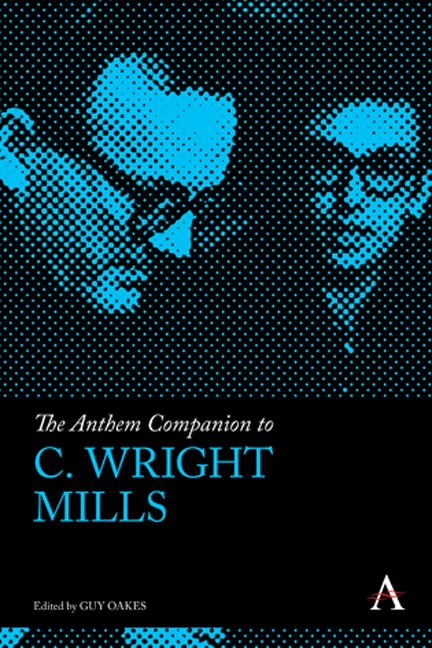Book contents
- Frontmatter
- Contents
- List of Tables
- Acknowledgments
- Introduction American Faust
- Chapter 1 C. Wright Mills on Law and Society: Hidden in Plain Sight?
- Chapter 2 Mills on the Economics of the Old Middle Class
- Chapter 3 Revisiting C. Wright Mills on the Militarization of Postwar American Society
- Chapter 4 A Critical Assessment of the Historical and Economic Underpinnings of C. Wright Mills's The Power Elite
- Chapter 5 Mills as Ethical Theorist: The Military Metaphysics and the Higher Immorality
- Chapter 6 C. Wright Mills and Latin America
- Chapter 7 For a Feminist Sociological Imagination: A Personal Retrospective on C. Wright Mills
- Chapter 8 The Sociological Imagination: A Reductionist Reading
- Chapter 9 Recent Changes in the Shape of Power
- Afterword. Mills as Classic?
- Contributors
- Index
Chapter 6 - C. Wright Mills and Latin America
Published online by Cambridge University Press: 17 June 2017
- Frontmatter
- Contents
- List of Tables
- Acknowledgments
- Introduction American Faust
- Chapter 1 C. Wright Mills on Law and Society: Hidden in Plain Sight?
- Chapter 2 Mills on the Economics of the Old Middle Class
- Chapter 3 Revisiting C. Wright Mills on the Militarization of Postwar American Society
- Chapter 4 A Critical Assessment of the Historical and Economic Underpinnings of C. Wright Mills's The Power Elite
- Chapter 5 Mills as Ethical Theorist: The Military Metaphysics and the Higher Immorality
- Chapter 6 C. Wright Mills and Latin America
- Chapter 7 For a Feminist Sociological Imagination: A Personal Retrospective on C. Wright Mills
- Chapter 8 The Sociological Imagination: A Reductionist Reading
- Chapter 9 Recent Changes in the Shape of Power
- Afterword. Mills as Classic?
- Contributors
- Index
Summary
Ideas inescapably mirror the historical and political milieus in which they are produced. The episode recounted in this chapter conforms to this basic fact. It deals with the mid-twentieth- century encounter between C. Wright Mills, an internationally famed American sociologist in the process of enriching an incipient comparative stance, and Latin America, a world region where disciplinary sociology was just beginning to adopt a professionalized outlook but where cosmopolitan influences were old and varied. Mills, who was conflicted about his unpreparedness to comprehend social worlds outside the United States, ended his life work with a political manifesto on the Cuban revolution that, however distortedly and unexpectedly, captured a pivotal episode in Latin American history. Mills's Listen, Yankee became an instant international success with multiple editions and translations, but the book was never published in Cuba. Curiously, no photographs of Mills's visit to the island can be found on the Internet or in the Mills family archives.
Mills read the revolution in Cuba through the lenses of his American radicalism, making an ambitious appeal to the American public to play a part in the evolving crisis. He cautioned against “mistakes of ignorance” (Mills 1960b, 7) in US policy on Cuba, a message that had a major echo at the time. Yet the legacy of Mills as a public intellectual with connections to Latin America was limited and ephemeral. His monolingual, embryonic cosmopolitanism allowed Mills to only glance over broader geopolitical hemispheric complexities and regional politics.
The story of Mills and Latin America constitutes an instructive puzzle for a global history of sociology. That global history remains insufficiently understood, despite significant transnational movement of competing paradigms and disciplinary forms over the last century and a half. New studies have analyzed the expanding sociological enterprise, and a recent wave of historiography is investigating contextual specificities and transnational connections. Much could be uncovered in the historical nexuses between rich and poor segments of the world community of scholars. Consider the intriguing paradox that while the politicized intellectual work in Latin America was by necessity cosmopolitan, Mills typified the American scholar in his dearth of internationalism, his incurious disdain for those working in less endowed academic circles, his difficulty perceiving the already internationalized character of the social sciences.
- Type
- Chapter
- Information
- The Anthem Companion to C. Wright Mills , pp. 119 - 158Publisher: Anthem PressPrint publication year: 2016



